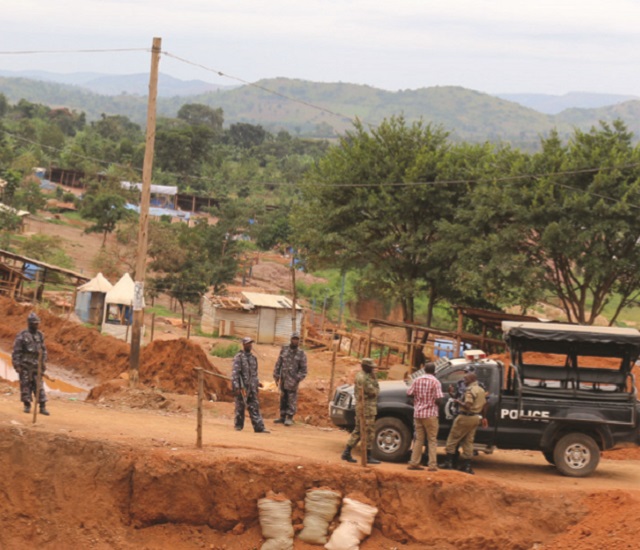
The report particularly mentioned President Yoweri Museveni who it accuses of influencing the awarding of deals to investors in the extractives sector. These investors, the report noted, sometimes turnout to be fake, evade taxes, and abuse human rights and the environment.
Global Witness found that it is routine for investors to pay certain employees in the Directorate of Geological Survey and Mines a fee to ensure that mining applications meet all requirements.
On Aug. 22, tempers flared and tears welled down the faces of hundreds of the artisanal miners as they recounted their experiences to MPs on Parliament’s natural resources committee who spent the day visiting several camps in the gold-rich subcounties.
One of the victims, Roy Franca, a woman in her 40s could not control tears as she spoke about property worth billions of shillings that, she said, was lost. She said some parents were yet to find their children who had gone missing.
All this, Franca said, followed the confusion that ensued when the heavily armed soldiers descended on the camps and ordered over 30,000 people to leave the camps within two hours.
Apparently, the order was followed by a looting spree of shops, clinics, bars, restaurants and mobile money shops that were in the mining camps. Many of the miners fled to the nearby trading centres of Lubaali and Bukuya in the hope that they could return to pick any remnants of their property. But three weeks later when The Independent visited, it was still not possible as the army remained there guarding the mines.
Another victim, Sam Kawere also barely holding tears back, told legislators that he has been left with nothing following the looting of his shop. He estimated that he lost about Shs20 million.
The land owners were overwhelmed too. Stephen Kayongo Mutumba, who owns one and half square miles in Lubaali, in Kitumbi Sub-County where one productive gold mine is located told the MPs that the UPDF soldiers did not give any warning to the miners and the landlords.
A report prepared by Lubaali artisanal miners, landlords and the business community in Kitumbi sub-county presented to the MPs about the eviction noted that over five years, the artisanal miners were mining here, mining had become a source of employment for the youth, who previously used to idle around commercial centres.
Francis Kibuuka Amooti, the LC V Chairperson of Mubende District told The Independent on Aug. 28 that unlike the formal mining companies which acquired exploration licences years ago, spent years doing unverified activities with no results, the people the government calls illegal miners came recently and have shown that they can find the gold.
On the tour, the MPs were joined by Peter Lokeris, the state minister for minerals, Isabalija, Edwards Kato, the Director at the Directorate of Geological Survey and Mines alongside officials from the National Environment Management Authority (NEMA).
Lokeris said the government’s decision is aimed at trying to re-organise the mining sector in the country. All mineral resources belong to the central government, he said, and it is the mandate of the Energy ministry “to promote the development, strategically manage and safeguard the rational and sustainable exploitation and utilization of mineral resources for social and economic development.” “The miners will come back in an organised manner,” he said. But nobody believes this.
On his part, Isabalija said that government was looking at having the local artisans doing their activities well without undermining those with mining licences.
“We shall register the local artisans,” he said, “so they respect the licences that are there so that the full exploration of minerals is done properly.”
Isabalija had earlier said in a letter dated Aug.2 that the government had moved to evict the artisanal miners, in order to organise them and regulate the sector better.
The NEMA and energy ministry officials accuse the artisanal miners of engaging in extensive environmental degradation of the mining area and employing potentially dangerous methods of mining with the use of cyanide and mercury.
Energy ministry officials also said the miners were making money without paying taxes and, as such, deprived the government of revenues.
Ruined livelihoods
Despite overwhelming evidence to the contrary, Isabalija insisted the artisans had been evicted peacefully. As the MPs toured three of the gold mining camps, evidence of violence was everywhere.
The UPDF soldiers in heavy camouflage jackets assisted by police men manned road blocks on the way to the Lubaali gold camp. Inside the empty camp, the silence was deafening—a reversal to what this reporter had witnessed when he first visited in October, last year.
Back then, thousands of enthusiastic young men and women could be seen armed with pick-axes, hoes and spades loading wheelbarrows with gold-bearing rocks. Others with muddy faces were descending or climbing out of pits, hundreds of metres deep, hauling huge sacks of rubble on their backs, wheelbarrows, bicycles, small trucks or panning for gold.
Buyers were also on standby haggling with the miners for the pea-like specks of gold. A gram went for anywhere between Shs 130,000 and Shs 150,000. It was a bustling mini city. One zone called “Saigon City” was probably the most hyperactive.
From bars selling some of the most expensive liquor to retail and whole sale shops, salons, clinics, mobile money kiosks, chapatti stalls, entertainment halls connected to satellite TV, lodges, restaurants, mechanical workshops and even a Pentecostal church— everyone was here determined to eke out a living from gold.
The gold camps had attracted many auxiliary businesses but, save for a police post, the central government seemed totally absent in this multi-billion enclave economy spurred on by gold.
But when the MPs visited on Aug.22, the machines had suddenly gone silent. The young women in restaurants, bars, lodges and shops were gone.
All that was left were abandoned pits with stagnant rain water and generators, solar panels, wheel barrows and rock crushers, wooden panning platforms and sacks full of gold-bearing dust and rock, and leaning poles with powerless electricity cables.
In the business and residential zones of the camp, there were empty kitchens, bars, lodges, restaurants, clinics and even a Pentecostal church—all stripped of iron sheets and their characteristic blue tarpaulins. In what used to be clinics, there were hundreds of unused condoms and drugs left on the floor. In one camp, the only reminder of a huge church which could sit probably 300 people were a few white plastic chairs and a big wooden cross still hung above the church’s entrance.
MPs from Mubende, led by Bukuya County MP, Dr. Michael Bukenya, say the eviction was uncalled for and that it is the responsibility of the government to educate the miners on safe mining practices and organise them into formal groups.
Isabalija defended the eviction as intended to organise the miners into formal groups and weed out foreigners and illegal miners. He said registration is expected to take three months. Nobody believed him.
****
 The Independent Uganda: You get the Truth we Pay the Price
The Independent Uganda: You get the Truth we Pay the Price



